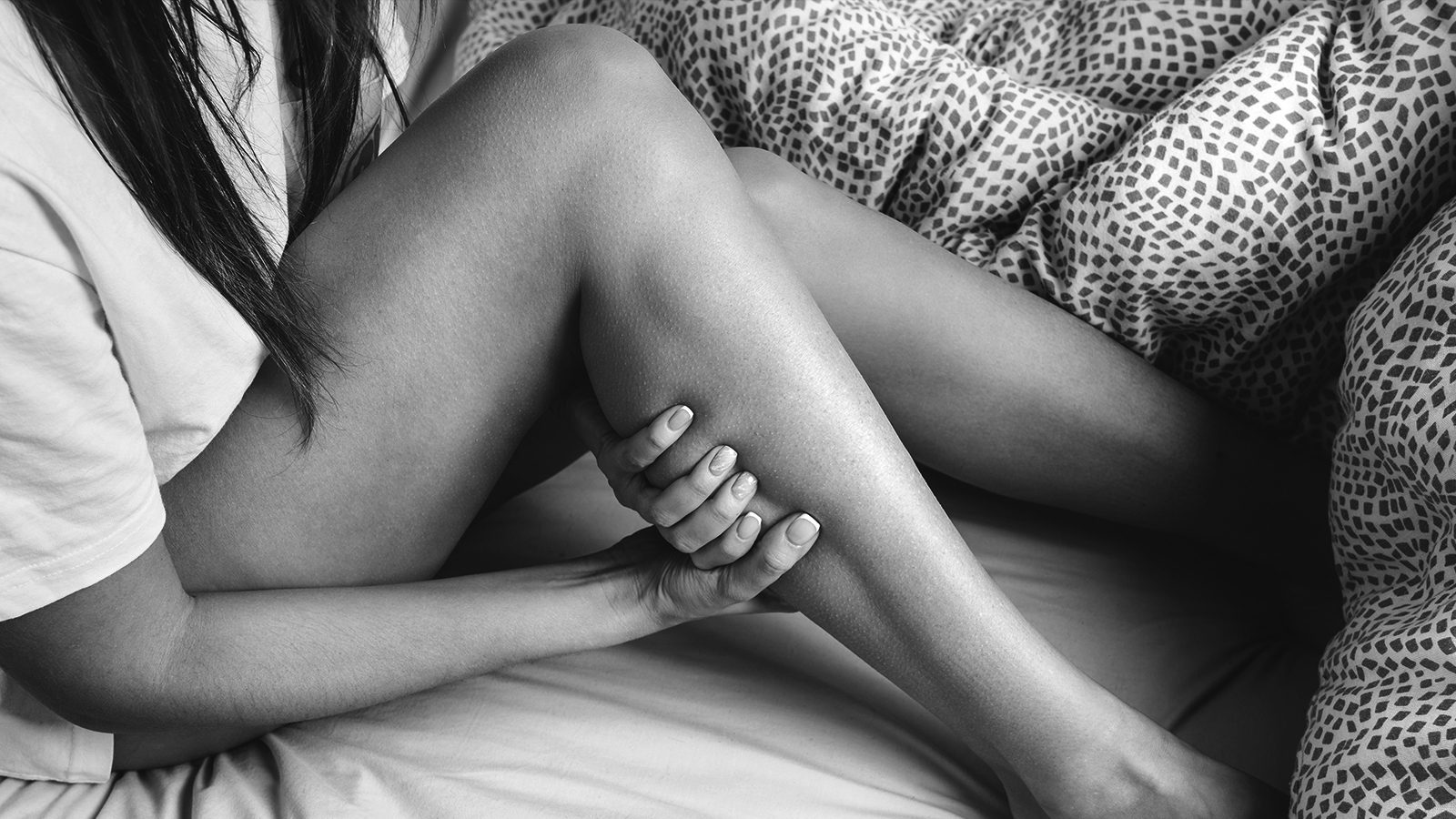Leg cramps are a harmless and common condition where your leg muscles suddenly get painfully tight. Most people experience this in their calf muscles, but it can happen in any part of your leg or feet. Sometimes, after the cramp gets better, you’ll still feel a soreness in the cramping area. Many people complain of leg cramps during the night.
Why is this situation called a charlie horse?
The painful, sudden muscle spasm you get in your legs is called a charlie horse. This name originated from a Hall of Fame baseball player, Charlie “Old Hoss” Radbourn, who experienced frequent leg cramps while playing in the 1880s. The nickname caught on with fans and has gained favor ever since.
Fifteen Causes of Leg Cramps and How to Fix Them
Some of these are surprising.
1 – Muscle overuse and lack of recovery time
Nighttime Charlie horses could indicate you’re overdoing it at the gym. Strenuous exercises put extra stress on your muscles. You may not allow your muscles enough time to rest between high-intensity workouts. High-intensity workouts create lots of tiny tears in your muscles. As these wounds heal, they cause your muscles to get stronger. Not allowing enough time for your muscles to recover adds stress, leading to leg cramps. If you enjoy working out, give your body time to repair and rest. This should eliminate the nighttime leg cramps.
2 – Dehydration causes leg cramps
Your body comprises 60% water. You must constantly replenish your body fluids throughout the day, especially if it’s hot outside or exercising. Leg cramps at night are often because of dehydration. Increase your water intake if you’re outside in hot weather, exercising a lot, and not drinking enough. You may want to drink an electrolyte drink that contains extra potassium. These can help replenish essential minerals lost through dehydration, so the Charlie horse disappears.
3 – Nerve damage
Nighttime leg cramps could be a symptom of early-onset diseases, such as nervous system disorders such as Parkinson’s disease. Nerve damage can also occur because of a car accident or other injury in sports. Some infections can lead to nerve damage and cause leg cramps. Discuss it with your doctor if you’re experiencing painful nighttime Charlie horses. They can do tests to determine if any of these reasons could cause nerve damage.
4 – Pregnancy often causes leg cramping
Leg cramping is common during pregnancy. This is because of all your body’s circulatory changes, especially in the second and third trimesters. Cramping may also be because of the stress on your muscles as your stomach grows. Exercising while pregnant is safe if you don’t strain your muscles. Exercise helps you control your weight and strengthen muscles over the months. Be sure to drink water to stay hydrated.
5 – Certain medications cause cramping
Some medications cause evening discomfort. They usually list these side effects on the medicines. Statin medication, taken to help treat high cholesterol, is one of the most common medications that may cause cramping side effects. Other drugs that may cause leg cramps to include the following:
- Zyrtec
- Aleve
- Lyrica
- Zoloft
- Wellbutrin
- Celebrex
- Xopenex
- Combivent
6 – Fatigue
If you’re exhausted and not sleeping enough, it takes a toll on your body. Rest allows your muscles time to rest and recover. You may not get enough sleep if you’re having leg cramps at night. You may be overly tired, and it’s showing up through cramping at night. Attempt to get at least 7 hours of sleep every night. Take time to rest your body and mind. You should notice a change in fewer leg cramps.
7 – Cirrhosis can cause leg cramps
Liver disease causes leg cramps. Cirrhosis is the scarring of your liver because of lifestyle choices like alcoholism or an infection. Although the liver can regenerate itself, permanent damage can occur. If you have liver disease, you may experience chronic leg cramps because of the medications used to treat this condition. If the cramping worsens, talk to your doctor about ways to find relief.
8 – Chronic kidney disease
People with chronic kidney disease (CKD) are prone to leg cramps. CKD erodes your kidney function so that toxins build up in your blood. The CKD mineral and chemical imbalances cause nighttime leg cramps and spasms. These may be because of the medications for CKD, so speak with your doctor about your cramping, and they can adjust your medications to help you ease the cramping.

9 – Age impacts evening leg cramps
As you age, you’re more prone to leg cramps. Older muscles get tired and are sensitive to fluid changes, leading to dehydration and leg cramps. Women are more prone to leg cramps as they age than men. One study found that older people in better shape were less apt to experience nighttime leg cramps. As you age, you must stay in shape with exercise and healthy eating. These things associated with nighttime leg cramps predicted less severe cramps that didn’t interrupt sleep.
10 – Peripheral artery disease
Individuals with circulation disorders are prone to nighttime leg cramps. This condition causes narrowing of your arteries, reducing blood circulation. People with PAD often have cold extremities, numbness, or weakness in their feet and legs. If you have PAD, be sure to get exercise to aid your circulation to your extremities. Speak to your doctor about your cramping to see what else you can do to ease the pain of nighttime leg cramps.
11 – Anemia might trigger cramping of the legs
Anemia affects your body’s ability to produce hemoglobin, a protein found in red blood cells. This protein carries oxygen to all of your body. If you’re low in hemoglobin, you’ll be anemic. You may need treatments to improve the oxygen flow in your body. They usually do this with medications such as iron supplements or infusions if your anemia is terrible. Anemia’s side effects are nighttime leg cramps. If you’re experiencing leg cramps at night for no apparent reason, get tested for anemia. Other symptoms of anemia include:
- Fatigue
- Pale skin
- Weakness
- Headache
- Dizziness
- Cold feet and hands
- Headaches
- Brittle nails
- Shortness of breath
- Chest pain
12 – Diuretics
Taking diuretics puts you at a higher risk for leg cramps. Individuals with high blood pressure often take diuretics. This medication helps reduce the fluid around your heart, which drops your blood pressure. Although diuretics are helpful, they have side effects like nighttime leg cramps. They can cause a fluid imbalance in your body, causing you to become dehydrated. If you’re taking diuretics, monitor them to keep the proper water balance in your body. Usually, a simple change to your diuretic will eliminate your nighttime cramping.
13 – Too high cortisol levels
Cortisol is sometimes called the “stress hormone.” That’s because cortisol aids your body when dealing with stress, like infections and other stressful situations you experience. It’s usually highest in the morning but drops off at night so that you can fall asleep. If your life is incredibly stressful for a season, it can make your body produce an oversupply of cortisol. This causes you to be in a constant, stressful response. You can’t sleep and feel jittery and anxious all day. The high levels of cortisol at night cause cramping. Try to lower your stress levels during the day by following these practices:
- Take frequent breaks
- Avoid drinking too much caffeine
- Exercise to help reduce your stress levels
- Get enough sleep
- Try yoga or meditation to relax
As your cortisol levels drop off, the Charlie horse should go away. If not, speak with your doctor about ways to help get relief.
14. Ill-fitted shoes
You can have a charlie horse when your shoes don’t fit correctly. Walking around all day at work or school with poor-fitting shoes puts stress on your legs and feet. Too tight shoes or too high heels press on the nerves of your feet and legs. If you’re experiencing nighttime muscle discomfort, changing your shoes for several weeks is worth seeing if that helps them go away. Choose shoes with support and comfort rather than stylish, uncomfortable shoes. They may look cute during the day, but the pain at night isn’t worth it.
15 – Seasons changing may trigger leg cramps
Did you know that a Charlie horse is more common in certain seasons? Indeed, they are more common in the summer, usually peaking in July. Studies show that complaints of leg cramps almost double in the summer. It’s unclear exactly why this happens, but it could be because nerve repair and growth are most active in the summer because of exposure to more vitamin D from the sun exposure. So, your body is speeding up doing these repairs, which triggers leg cramps.

Final Thoughts on the Causes and Fixes for Evening Leg Cramps
A Charlie horse is harmless but can be painful to deal with. They may disrupt your sleep and cause tenderness for hours afterward. If you suffer from leg cramps, check out these fifteen causes to see if one could be why you’re getting a charlie horse at night.



















